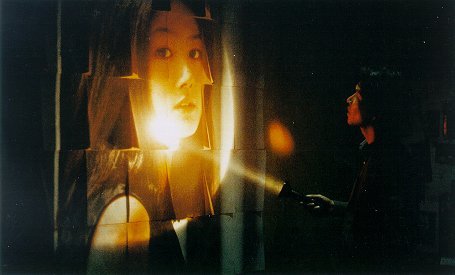한국 스타 시스템의 끌어당기는 힘은 지난 주 삼척에서 열린 <외출> 기자회견에서 확연히 드러났다. 몇 년 전이었다면 100% 한국인 캐스트와 제작진이 100명의 일본 기자를 끌어 올수 있다는 생각은 정신 나간 환상 같았을 것이다. 하지만 현시점에서 한국 스타 시스템은 할리우드 그리고 어쩌면 인도 외의 그 어떤 다른 나라 영화계의 것 보다 더 많은 에너지를 자랑한다. 홍콩과 일본의 스타 시스템은 강하긴 하지만 한창때가 지났으며, 유럽의 스타 시스템은 할리우드에서 나오는 눈부신 빛 때문에 위압당하고 있다.
좋은 일인가 나쁜 일인가? 퀜틴 타란티노는 작년 칸느에서 스타 시스템이 없는 지역이라면 효과적인 영화업계를 지닐 수 없다고 주장했다. 물론, 타란티노는 할리우드에서 일하니까 그런 말을 할 거라 기대할 수도 있는 일이다. 한국 영화업계에서 시스템에 대한 찬양 보단 불만이 더 많이 들리기가 나름이다. 제작자들은 큰 스타가 없는 영화는 투자를 끌어올 수 없다고 주장하고 있으며, 더 높은 출연료는 또 통제가 안 되는 제작비에 기여한다. 스타의 필요성은 감독들이 캐스팅할 때 선택의 폭에 제한을 두게 되며, 한국영화의 다양성에 부정적인 영향을 줄 수 있다. 이런 모든 주장은 타당하다. - 스타 시스템이 장점과 단점을 모두 동반한다는 것은 분명하다. 그렇지만 이중 많은 문제는 스타 시스템 자체에서 보다 스타에 대한 투자자의 태도에서 나온 것 같기도 하다. 어쩌면 진짜 필요라면, 지식과 경험이 풍부하면서 모험을 꺼리지 않는 투자자가 필요한 것일 수 있다.
한국이 스타 시스템을 통해 버는 추가적인 돈(일본 회사들이 톱스타가 나오는 한국영화에 얼마나 지불하려는지 보라)의 명목을 떠나서, 창의적인 근거로 스타시스템을 지지해야 할 정당한 이유도 있다. 무명의 배우에 반해, 스타는 맡은 역할을 떠나서 관람자의 머릿속에 분리된 정체성을 지닌다. 이는 관람 경험에 추가적인 복합성을 더해주는데, 연출자가 활용할 수 있는 것이다. (예를 들어 <텔미섬딩>은 심은하의 스타 이미지를 교묘하게 활용하여 용의자의 벽에 그녀의 얼굴이 실물보다 더 크게 보이기도 한다.)
또 스타를 통해서라면, 주연 또는 조연 역할 배우들의 커리어가 진전하면서 관람자의 영화에 대한 인식도 시간이 지남에 따라 달라질 수 있다. 오늘날 임상수 감독의 <처녀들의 저녁식사>를 보는 이들은 설경구가 짧지만 기억에 남을 만 한 역할에 나오는 것을 볼 때 다른 방식으로 그것을 경험할 것이다.
국제적인 맥락에서 스타는 다른 문화에 쉽게 접근하여 들어갈 수 있게 하는 기능을 할 수 있다. 홍콩의 17살짜리가 학교에서 어떤 언어를 공부할지 결정하려는 것을 상상해보자. 장동건의 팬이라면 어쩌면 그가 출연한 영화들을 원어로 보기 위해 한국어를 배우게 하는 동기가 될 수 있다. 나중에 장동건에 대한 열정이 사라진다 하더라도, 언어수업을 통해 한국을 접한 것이 그 문화에 대한 보다 깊은 이해를 하게 되는 계기가 될 수 있다.
그래서 스타들은 지지할 만 하다 할 수 있을 것이다. 이런 의미에서 한국 배우들의 전통적인 지지 시스템이라 할 수 있는 매지먼트사들이 영화업계의 다른 부문들이 지닌 수준에 못 미치는 것이 안타까운 일이다. 해외에서의 - 국제 프로듀서나 한국의 탤런트계를 아는 다른 사람들의 - 관점에서 보기엔 대부분의 한국 매니지먼트사들은 배우나 그들의 커리어 보다는 매니저의 이득을 위해 운영되는 것처럼 보인다. 한국 스타보다 할리우드나 홍콩 스타들의 커리어가 훨씬 더 길게 지속될 수 있는 것은 어쩌면 스타의 커리어를 장기간 육성할 수 있는 잘 길러진 전문가가 있어서일지도 모른다. 한국 매니지먼트사에서의 지배적인 태도는 배우들에게서 가능한 한 많은 돈을 가능한 한 빠른 기간동안 쥐어짜내자는 것 같다. 길고 성공적인 커리어를 만들어낼 수 있는 방법은 아니다.
The pull of Korea's star system was evident last week in Samcheok at the press conference for April Snow. A few years ago, the idea of a film with a 100% Korean cast and crew attracting 100 reporters from Japan would have seemed like a crazy fantasy. But at the present moment, Korea's star system boasts more energy than that of any other national cinema outside of Hollywood, or perhaps India. Hong Kong and Japan's star systems are strong, but past their heyday, while European star systems are overpowered by the glare coming from Hollywood.
Is this a good thing or a bad thing? Quentin Tarantino argued at Cannes last year that a territory without a star system could not have an effective film industry. Of course, Tarantino works in Hollywood, so you might expect him to say something like that. In the Korean film industry, complaints about the system usually seem to outnumber plaudits. Films without a major star cannot attract financing, producers argue, and higher salaries contribute to out-of-control budgets. The need for stars limits directors' choices when casting, and can negatively affect the diversity of Korean films. All of these are valid points ? clearly, the star system brings both negatives and positives. It does seem, however, that many of these problems spring from investors' attitudes towards stars, rather than the star system itself. Perhaps the real need is for experienced, knowledgeable investors who are willing to take risks.
Apart from all the extra money Korea earns through its star system (look how much Japanese companies are willing to spend for a Korean film with a top star), there are legitimate reasons to support the star system on creative grounds. As opposed to unknown actors, stars carry a separate identity in viewers' minds, outside of the role in which they appear. This creates an added layer of complexity to the viewing experience, which directors can exploit. (Tell Me Something, for example, cleverly plays off the star image of Shim Eun-ha with images of her face appearing larger than life on a suspect's wall)
Through stars, viewers' perceptions of films can also change over time, as the actors in leading or supporting roles see their careers advance. Contemporary viewers watching Im Sang-soo's Girls Night Out will experience it in a different way, when they see Sol Kyung-gu appear in a short but memorable supporting role.
In an international context, stars can function as an easy point of entry into another culture. Imagine a 17-year old from Hong Kong trying to decide which language to study at school. If she happens to be a fan of Jang Dong-gun, it may motivate her to study Korean so that she can try watching his movies in the original language. Even if her infatuation for Jang later fades, her encounter with Korea through language classes may lead to a deeper understanding of the culture.
So stars, it seems, are worth supporting. In this sense it's a shame that Korean actors' traditional support systems ? talent agencies ? lack the sophistication of other sectors of the film industry. The view from abroad ? from international producers and other people familiar with Korea's talent scene ? is that most Korean talent agencies are run more for the benefit of the talent agents than for the actors or their careers. Perhaps one reason why the careers of Hollywood or Hong Kong stars last so much longer than their Korean counterparts is that they have well-trained professionals to nurture their careers for the long term. At Korean talent agencies the prevailing attitude seems to be, squeeze as much money out of your actors as you can, as quickly as possible. This is not the way to build a long and successful career.







